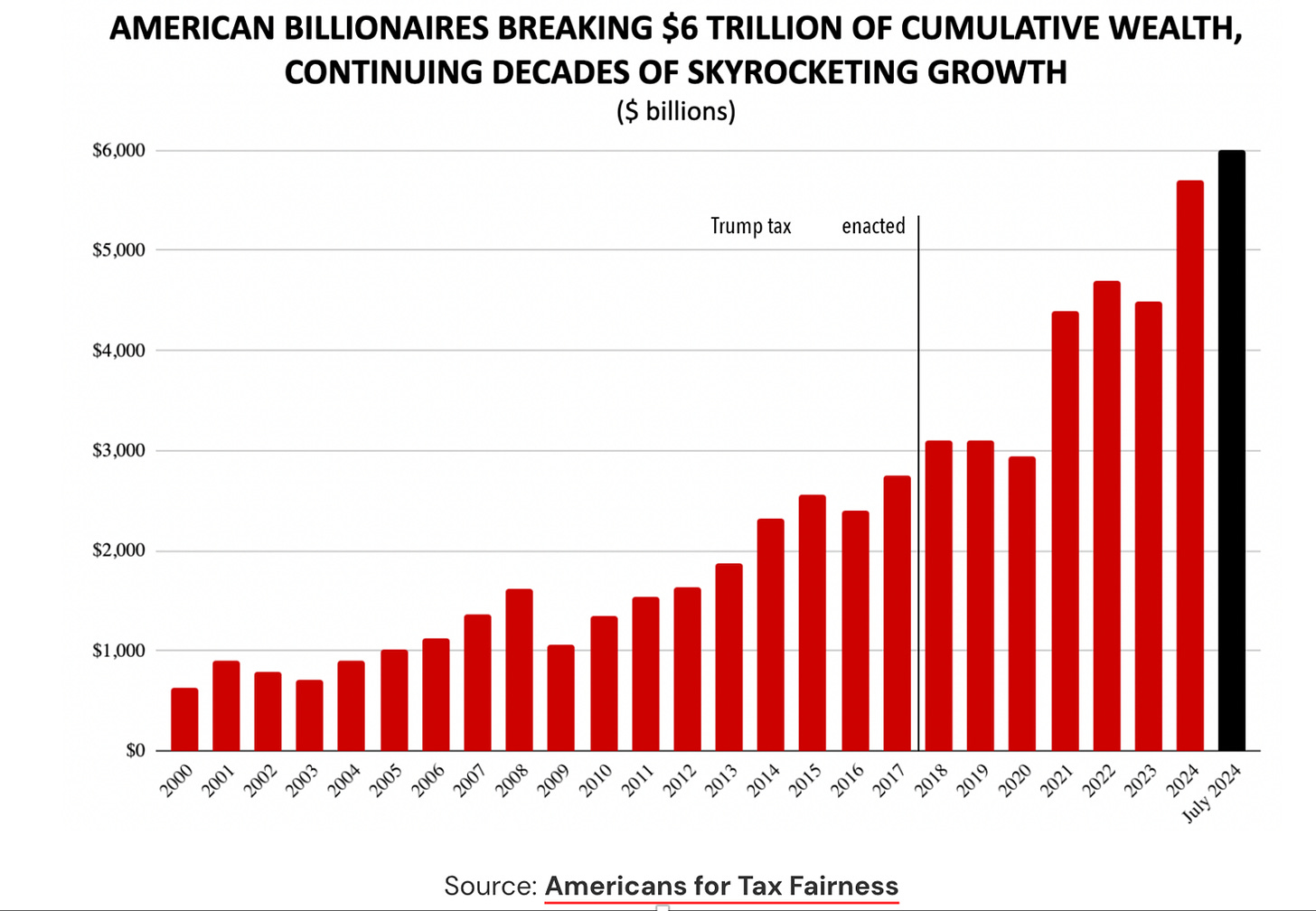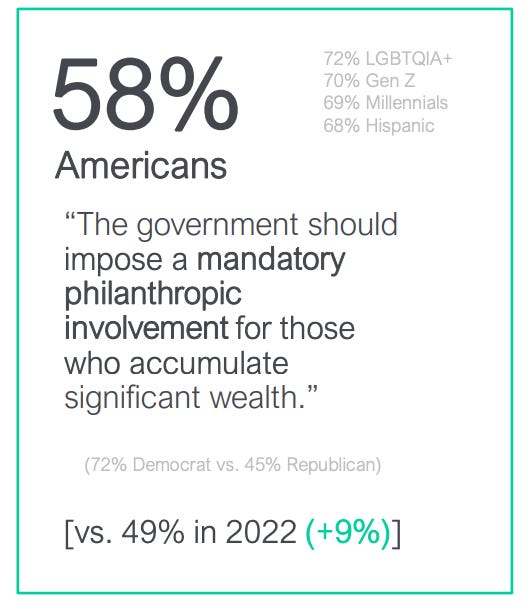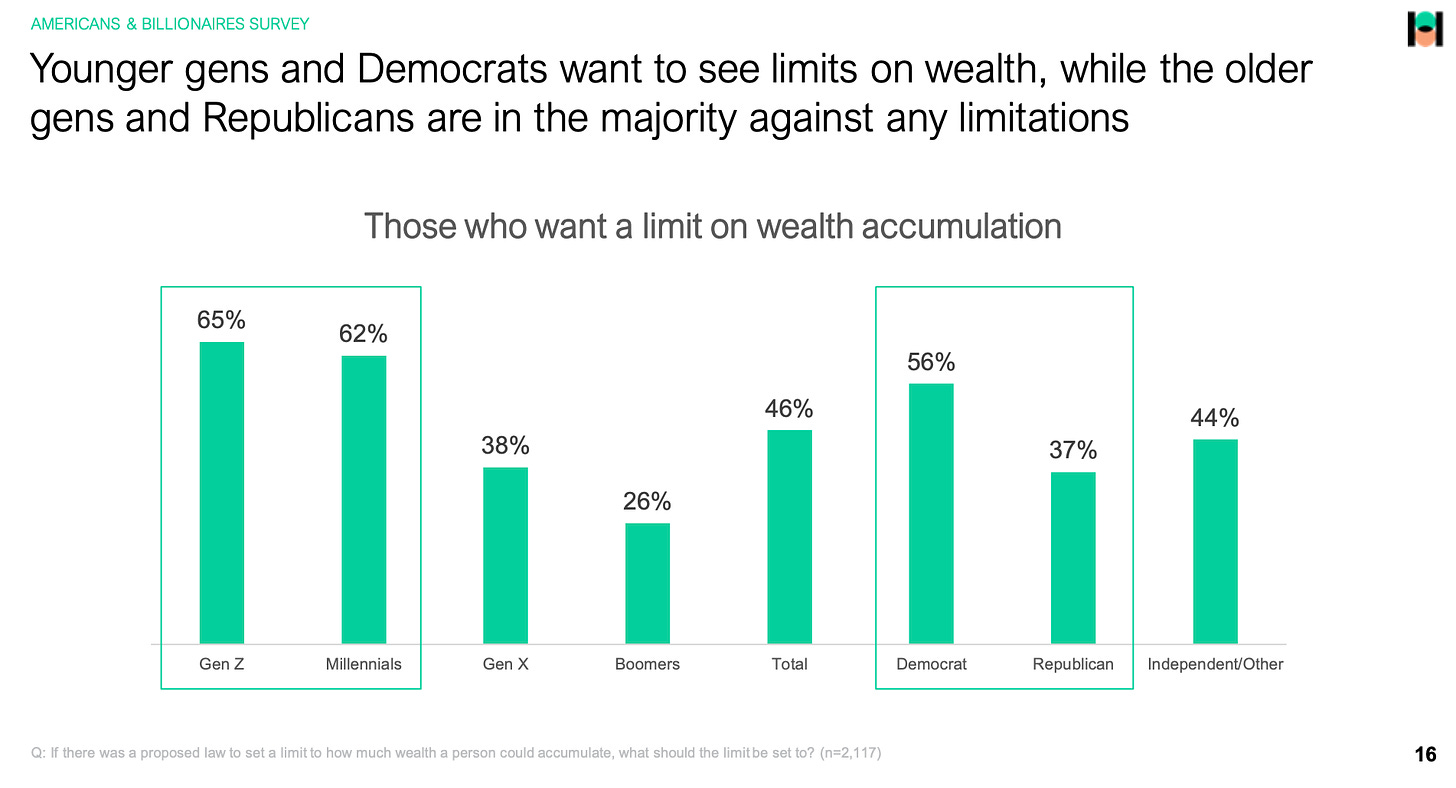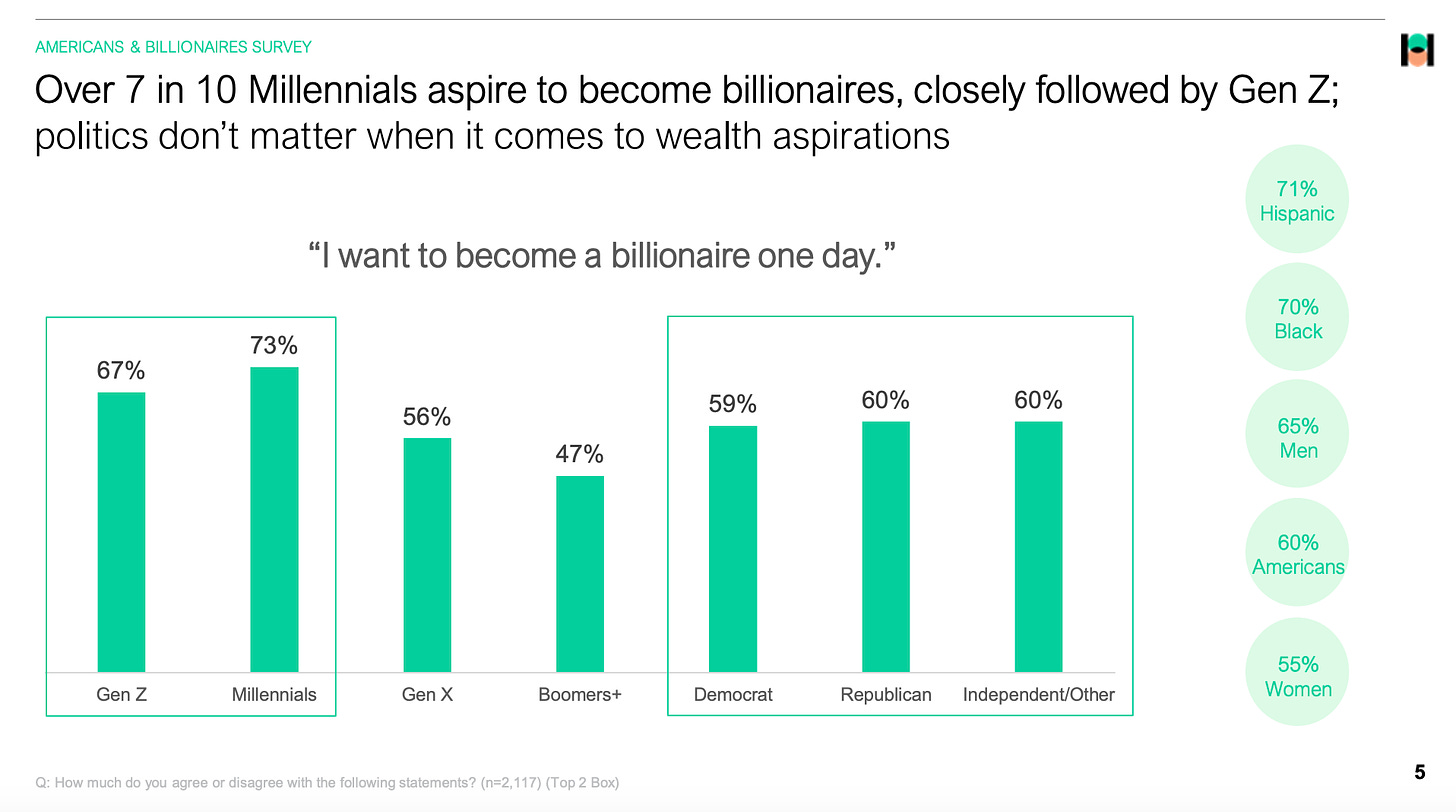Billi-Status: America's Love-Hate Relationship with Extreme Wealth
In a culture full of 'eat the rich' sentiment and growing wealth inequities, Americans still want to win the golden ticket of 'billi' status
Our latest "Americans & Billionaires Survey," published in Fortune, provides an updated and deepened understanding of the American sentiment towards the ultra-wealthy. As of 2024, the stark and climbing figures of billionaires, whose numbers have swelled from a mere 66 in 1990 to a striking 748, with over $6 Trillion in wealth, illustrate a vivid tapestry of American capitalism and its ability to foster extraordinary wealth.
This survey, reflecting the views of over 2,000 Americans, builds upon our foundational 2022 data featured in CNBC. It gives us insights into the complexities of wealth, aspiration, and societal obligations in a time of widening economic divides.
According to our latest findings, 71% of Americans identify wealth inequality as a significant issue, a 5% increase from 2022.
The concept of a billionaire in America today is almost fantastical, magnified by cultural narratives like the recently released horror movie Blink Twice, which captivates and vilifies the ultra-rich, mirroring a society deeply entangled with its own economic fantasies and fears. Yet, as the Atlantic points out, in shows like “Industry”, the narratives simultaneously glamorize and critique the desire for wealth. This duality reflects a society wrestling with its economic ideals and the harsher realities of its manifestations.
Understanding the scale of billionaire wealth can be challenging. To illustrate, consider Humphrey Yang's viral video, in which a single grain of rice represents $100,000. He then takes a trip to Costco to buy bags of rice to demonstrate the enormity of billionaire fortunes such as Jeff Bezos's, which escalated from $122 billion in 2020 to an astonishing $195.6 billion today.
Also, check out 1-pixel wealth, where you can endlessly scroll through Jeff Bezos's massive wealth pile.
In Fortune, Bob Lord argues for critically examining the escalation from mere billionaires to 'centibillionaires' and potentially 'trillionaires' unless significant policy interventions are enacted.
Our report found that 62% of Americans expect to see trillionaires in their lifetime.
What does the data say?
1. Billi-flation & Hunger Games Anxiety
The notion of "Billi-flation" has taken hold, encapsulating the idea that billionaire wealth contributes to everyday financial hardships for average citizens. 58% of Americans hold billionaires accountable for contributing to inflation, making everyday goods and services less affordable, with 45% saying that “billionaires make it harder to achieve my American Dream.”
The landscape of financial anxiety is not just about escalating costs for essentials like groceries and gas but also about the existential fears concerning future job security and soaring housing costs. This dynamic has intensified the belief that America's economic scales are tipped heavily in favor of a few, leaving the majority to struggle.
2. A Call for Conscious Wealth
71% of Americans feel that billionaires should leverage their vast resources to better society. And 68% say, “Billionaires have an ethical responsibility to address humanitarian crises happening around the world.” Showcasing a strong demand for significant contributions beyond mere wealth accumulation.
And if they don’t, the American public thinks the government should intervene.
3. A Generational Call for A Fairer System
2 in 3 Americans believe billionaires don’t pay their fair share of taxes. Furthermore, there's considerable support (69%) for implementing taxes on the ultra-rich to fund essential services (i.e., affordable healthcare, affordable housing, and food security), highlighting a widespread call for redistributive financial policies.
The generational divide on wealth is striking. Gen Z shows a pronounced preference for stringent wealth regulation, with 65% advocating for wealth accumulation caps—a stark contrast to the 26% of Boomers who feel the same. This gap underscores a shifting paradigm in how wealth and equity are viewed across different age groups.
4. A Willy Wonka World- Dreams of a Billion Dollar Ticket
Despite the criticisms, the aspiration to achieve billionaire status remains strong, with 60% of Americans still harboring this dream. Millennials, in particular, are the most money-struck, with 73% aspiring to this level of wealth.
As Billionaire status continues to captivate the preferred routes to wealth are diverse and shift depending on generation.
Featured in Robert Frank’s Inside Wealth CNBC newsletter
The results show that when it comes to perceptions of how to become rich in America, every generation has a different path, shaped in large part by their economic experiences, culture and technology. Millennials rank “becoming the CEO of a company” first (39%), followed by stock market trading (38%) and entrepreneurship (36%). Gen Xers also ranked stock trading first (41%), followed by entrepreneurship (40%).
Artificial intelligence ranked fairly high by all generations, at around 30%, and “becoming an A-list celebrity" was consistently in the middle for all generations, at about 24%. There was a wide divergence around crypto, with 25% of Gen Z survey respondents saying crypto was a lucrative way to become rich, compared to just 6% of boomers.
Conclusion: A Call for Holistic Solutions to Wealth Inequality
The persistent wealth inequalities in America are a complex challenge that cannot be resolved by the philanthropic gestures of a few billionaires. The data underscores a dual narrative: a profound resentment towards the concentration of wealth and a persistent desire among many to one day join the ranks of billionaires themselves. This dichotomy highlights the enduring allure of immense wealth, even as it elicits significant public scrutiny and demands for accountability.
Shout out to Tim Osiecki and Ethan Hermann, for leading this report!
3 Links
More than 28% of Americans are now searching for a new job — the highest rate in a decade (NBC News)
Pack Lunch, Drop Kids Off, Skate,Work (NYTimes)
How to fine-tune AI for prosperity (MIT Tech Review)
Curiosity is contagious; if you like this newsletter, please share it!!
Penned by Libby Rodney and Abbey Lunney, founders of the Thought Leadership Group at The Harris Poll. To learn more about the Thought Leadership Practice, just contact one of us or find out more here.













